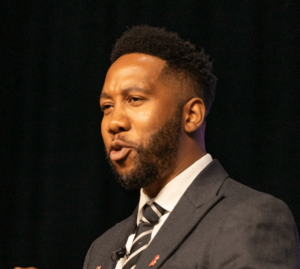by Kyle Burgess on January 30, 2020
Campus

by Hannah Langley ’21
News Co-Editor
Nearly 50 years ago, Rev. Dr. Martin Luther King, Jr., pronounced “I Have A Dream” to the entire world, advocating for racial equality and civil rights in America.
This past Friday, January 24, at the convocation event held in the famous leader’s name, Ndaba Mandela, grandson of Nelson Mandela, reiterated this message to the Providence College community, advocating not only for diversity reforms, but also for reforms in all areas across the globe. Inspired by Dr. King’s words, Mandela stated, “If your dreams don’t scare you, they aren’t big enough.”
After beginning his speech by thanking God and quoting Dr. King, Mandela recounted the first time he remembered meeting his grandfather, Nelson Mandela. Born in 1982, Ndaba Mandela grew up under apartheid in South Africa. He admitted he was mainly sheltered from the brutality that surrounded him.
He recounted how at around eight years old he was told by his parents they were going to visit his grandfather in prison, and what he saw was not what he expected. He remembered pulling up to a beautiful, big house with a pool, a personal chef, and more, thinking how could this be jail? He said he learned later in life, however, “They tried to break his mental strength.”
The apartheid government wanted to break Mandela’s will to work for reform by giving him this comfortable life in isolation, but he never backed down. It was in this moment Ndaba Mandela decided, “I want to go to jail,” meaning he wanted to be like his grandfather and work for reform in society.
Two of the largest programs Mandela advocates for in his work are HIV/AIDS and creating more awareness and a more positive image for the continent of Africa. Mandela remembered visiting the United States for the first time, telling the story of when he and his cousin went to Disney World. It was then that Mandela started to realize the image and perception people have of Africa is extremely skewed. He recounted how one person asked him how big the lions were, to which he and his cousin gave him a strange look and laughed, and how another person mentioned how they thought they would need guards for safety to visit Africa.
“People outside this country don’t know much about Africa,” said Mandela. “We want to change the stigma,” he said, from being just about the amount of poverty, violence, hunger, and safaris in Africa. “We want the younger generation to be proud of their identity and proud to say ‘I am an African.’”
To further this work, Mandela established Africa Rising Foundation in 2009 to instill a sense of pride within Africans and educate the world about Africa’s growing economy and rich culture. He also founded the Mandela Institute for Humanity to promote “youth empowerment,” saying the goal was to “teach young people to work the same way as Nelson Mandela.”
In addition, he has done extensive work surrounding the HIV/AIDS epidemic in Africa, relating his work back to his own personal experience of losing both of his parents to the disease.
Mandela talked about how people were and still are “dying in silence,” and it is the responsibility of everyone, especially parents, to communicate with their children about the risk of HIV/AIDS, especially in today’s “MTV culture” as he put it.
Mandela rallied the crowd by talking about how this new year and the new decade is the time for reform and change. “Our grandparents fought the good fight,” he said, relating to his grandfather’s own work against Apartheid. “Now it’s our turn to fight,” he said.
He stated his advocacy for new voices to rise up and take a stand, saying, “We cannot allow criminals to continue to parade around as officials in our society.” He continued, saying there is a lack of youth participation, arguing, “Young people are marginalized and don’t have a voice anymore.” He argues that if it is because people are too afraid, we should “hold each other’s hands and march together,” just as young people used to do.
Several members of the PC community were awarded for such outreach and service during the convocation ceremony, as well.
Dr. Terza Lima-Neves ’00, originally from Cape Verde, was awarded for her work as a political science professor and chair of the department of social and behavioral sciences at Johnson C. Smith University, where she contributed towards research in international politics, global gender studies, and the current African diaspora in America. During her reception of her award, her son ran up on stage with her, and the audience saw the love and support received by her family.
Jack Murphy ’20 was also awarded for various service works he has done during his four years at PC, including his outstanding work in Nicaragua during his summer with the Father Philip A. Smith, O.P., Fellowship for Study and Service Abroad. The Organization of Latin American Students (OLAS) also received an award for their work in sponsoring events on campus that promote inclusivity, social justice, equality, and universal freedom.
Students and staff walked away from the event with a renewed sense of community and belonging, inspired by the dream which Dr. Martin Luther King, Jr. shared all those years ago.